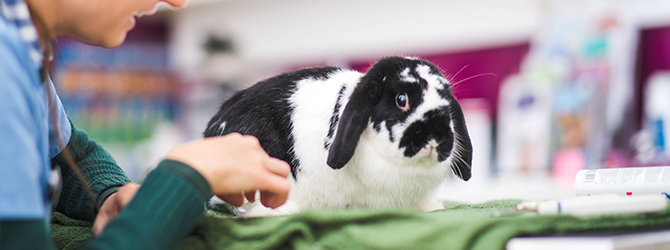How to look after a rabbit: the 5 essential freedoms
Rabbits are intelligent, playful creatures that make for loving pets. Sadly, too many pet rabbits live without their essential freedoms.
How to look after a rabbit properly? See listed below the five essential freedoms rabbits need in order to live out happy, healthy lives.
Freedom from stress and suffering
Rabbits thrive in the company of other rabbits. They’re prey animals in the wild and work together in groups to warn one another when predators approach. If a rabbit is the only creature of their kind in a household, they may feel stressed and lonely.
To avoid this, we recommend getting at least two of them. Two neutered bunnies, introduced to one another at a similar age and size, will quickly become friends.
Freedom to behave naturally
Think about how much land a wild rabbit covers during their lifetime. Now think about the size of a standard rabbit hutch…
Space is a fundamental aspect of responsible rabbit care. Make sure your bunnies have an outdoor area they can explore to their hearts’ content. If your bunnies are indoor bunnies, use the space available to the best of your ability.
Freedom from danger and discomfort
That’s not to say rabbits won’t grow to become very comfortable in their hutch. When purchasing a new hutch, or even when looking at the one you have now, consider these things:
- Is it weatherproof and raised from the ground to avoid damp?
- Does the run lead to a safe grassy area, just as their burrow would lead to in the wild?
- Do they have access to shade at all times?
- Is the hutch stored somewhere safe? (A garage wouldn’t be ideal because of car fumes and the unpredictable temperature)
- Is there plenty of clean, dry bedding and do you change it regularly?
- Is the hutch secure enough to keep potential predators away?
Hutches should be a minimum of 6ft x 2ft x 2ft high. The run should be no smaller than 8ft x 4ft x 2ft high and should attach to the hutch so your rabbits can come and go as they please. As a basic factor of responsible rabbit care, bunnies should be able to stand up, lie flat and move about in their enclosure easily.
Freedom from illness
To stay safe from nasty diseases such as myxomatosis, rabbits will need vaccinations.
When looking at how to look after a rabbit so they stay disease-free, feeding them the correct diet is equally important. Grass or hay should make up at least 85% of a bunny’s diet. The act of regular chewing helps to wear down their teeth, keeping them safe from dental problems, which commonly occur because of overgrown teeth. The high-fibre content of grass/hay will also aid their digestion, keep their droppings as they should be and in turn, reduce your rabbit’s chances of getting Flystrike.
Cleanliness also plays a huge part in maintaining your rabbits’ welfare. You should aim to clean their hutch daily, and check on your bunnies every morning and evening – this includes checking that the area beneath their tail is clean.
Freedom from hunger and thirst
Rabbits are grazers. This means that they should have food and clean water readily available throughout the day. The vast majority of their diet should consist of grass or hay. Sugary foods such as carrots and apple slices work well as treats, but you should avoid feeding them to your bunny on a regular basis.
An overindulgence in unhealthy foods will affect a rabbit’s digestion and can lead to weight gain – affecting the bunny’s ability to carry out its natural behaviour.
Balance is key! Treat your rabbit to suitable greens (broccoli, lettuce) and feed pellets and other processed foods sparingly, unless told otherwise by your vet. Above all, make sure your bunnies’ hay/grass supply is fresh, clean and topped up regularly.
Is a rabbit the right pet for me? Read more.
Need more info?
If you need more info on how to look after a rabbit properly and maintaining their welfare, have a chat with your local vet.
Find your nearest vet using our Find a Vet page, or speak to a vet online using Online Vets.

